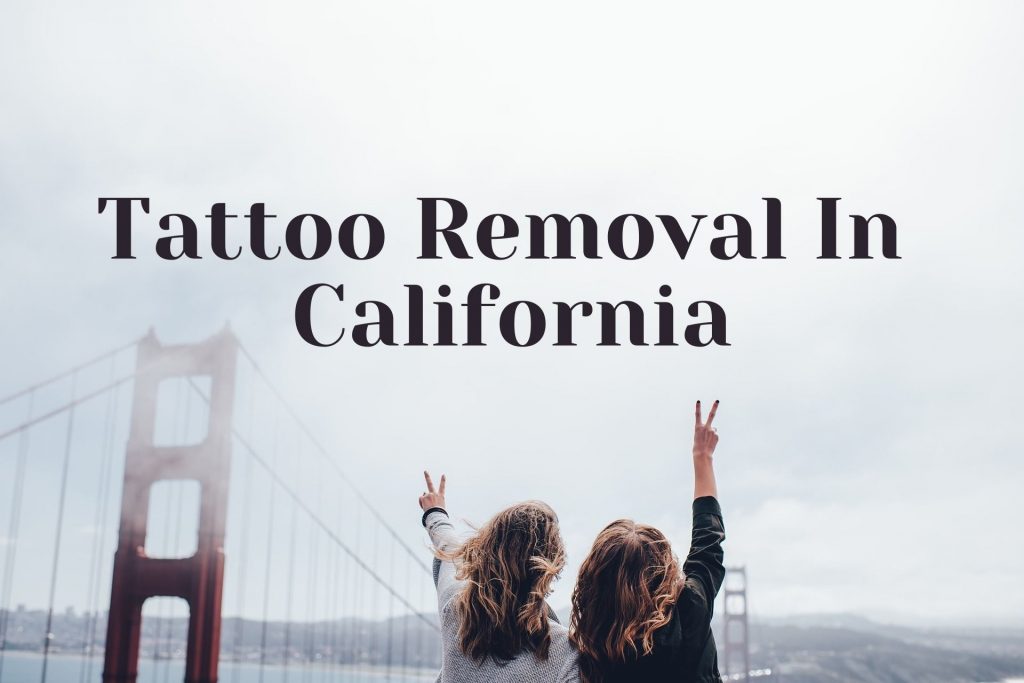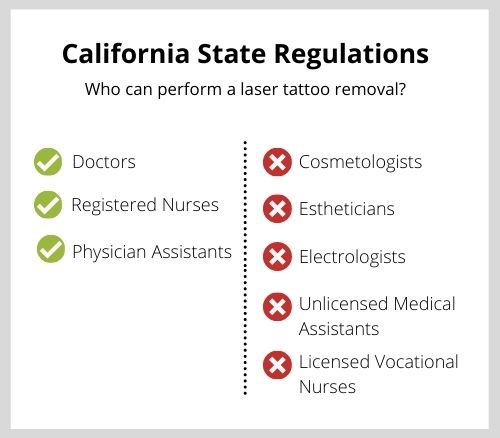
Over 11.9 million* people in CA have at least one tattoo on their bodies. As more and more people get inked, there are greater chances of people suffering from tattoo regret at some point in their lives. The solution – either to get rid of it or get a cover-up tattoo – is a potential business opportunity with great returns. Laser tattoo removal has emerged as the easiest, safest, and most cost-effective form of treatment. California has a rich tattoo culture. In fact, San Francisco and L.A. are two of the ten U.S. cities with the most tattoos. But the Golden State also has some of the strictest medical laws and regulations. The new tattoo removal business must abide by all these laws to run smoothly. It’ll also warrant the establishment as safe and legitimate.
A few things to consider before starting a tattoo removal business in California:
Tattoo Removal Business Start Up
When starting a tattoo removal business, there are several crucial things to consider, plan, and implement. For a step-by-step guide to starting a tattoo removal business, click here. The business will also require insurance coverage. For a detailed analysis of which insurance covers the business will need, click here.
It ultimately comes down to this: laser tattoo removal.
Laser removal has emerged as the go-to treatment. It is effective and comparatively safe, being a non-invasive skin treatment. A laser tattoo removal clinic can be a highly profitable business.
Laser Tattoo Removal California Requirements
In CA, the Medical Board of California (https://www.mbc.ca.gov/) is responsible for all healthcare matters, including tattoo removal procedures. This body issues permits and licenses and passes laws and regulations relating to the medical sector. According to the Board, laser tattoo removal is a cosmetic procedure. This implies that only medical personnel can legally perform such a procedure. A licensed doctor, a physician assistant, or a registered nurse can fire a laser in the state. This does not, however, include unlicensed medical assistants, cosmetologists, estheticians, licensed vocational nurses, and electrologists.

Which facilities can offer laser treatments in CA?
Laser tattoo removal treatments can be provided either at a doctor’s clinic or a non-medical facility (for example, at a med spa) as long as it’s performed by an approved medical practitioner. Such facilities must maintain a healthy and hygienic environment. They must also have proper medical emergency plans in place.
Who can run or own a tattoo removal shop in California?
According to the Business and Professions Code section 2052, a facility offering or providing medical services must be owned by a person who can legally practice medicine. A business owned by a layperson shall be deemed as an unlicensed practice of medicine. A nurse can also not own a private clinic without a physician’s supervision. Laser tattoo removal services can be offered only at a medical practice owned by a physician or at a professional medical corporation where a physician is the majority shareholder. A partnership set up between a non-medical professional and a physician is also illegal. And while the physician is not required to be on-site at all times, he/she must be within immediate reach.
Finding a location: The California Business Investment Services unit of the Governor’s Office of Economic Development (GO-Biz) offers help and suggestions to those looking for a suitable clinic/office space.
How to become a doctor?
Becoming a licensed doctor requires years of education and training. An undergraduate degree (4 years), preferably majoring in subjects like biology, natural sciences, etc. is the first step. It is followed by 4 years in a medical school, the first two years being theoretical, and the last two working with real patients. MCAT (Medical College Admission Test) serves as the entrance examination for all medical schools in the US. Residency programs last for 3-7 years after medical school. Here students work in the medical field they wish to specialize in. The Medical Board of California issues licenses to students who have passed all national exams and have 1-2 years of postgraduate training in their chosen area of specialization.
How to become a physician assistant?
An aspiring physician assistant (PA) is required to graduate from an approved PA training program before they can apply for a license. The general pre-requisites for such a program is an undergraduate degree (preferably in healthcare or science) and work experience in the healthcare sector. The program must be associated with a medical school and must include theoretical studies and hands-on clinical training. Clearing the Physician Assistant National Certifying Exam (PANCE) is the next requirement. Following this, they may apply for a PA license to the Physician Assistant Board.
How to become a registered nurse?
California has three different pre-licensure nursing programs and also offers two alternative routes to become a registered nurse (RN). An Associate Degree in Nursing (ADN) can be taken from many community colleges and can take up to 2-3 years. Bachelor of Science in Nursing (BSN), also known as a baccalaureate degree, takes 4 years to complete. Entry Level Masters Program in Nursing (ELM) is suitable for individuals who already have a baccalaureate degree in another field and wish to become an RN. Depending on how many nursing requisites were already met, it may take anywhere from 1-2 years. Completion of this course leads to a master’s degree. California Licensed Vocational Nurses can become registered nurses in 18-24 months through the LVN 30 Unit Option. This course alone does not offer a degree. It is also not recognized in other states. Military corpsmen are also eligible to take the RN national exam if they have clinical experience and the required RN level education. Taking a few college prep classes in school (for example, English – 4 years, Maths – 3-4 years, etc.) can also provide a head start in nursing school. The California Board of Registered Nursing (BRN) also offers various grants, loans, and scholarships. Following this, the candidate must apply to the BRN for an RN license.
Medical license expires every two years and needs to be renewed.
Ethical Code
Doctors, PAs, and RNs are bound by the Medical Practice Act that specifies rules of professional conduct. Instances of misconduct include negligence, license fraud, sexual harassment of a colleague or a coworker, working under the influence of drugs or alcohol, to list a few. It is the ethical responsibility of the medic to inform the patients of every possible risk of the treatment. Moreover, they cannot treat a patient under the age of 18 without parental consent.
Violation of any of these laws and regulations may lead to disciplinary action by a state investigation. In such cases, the guilty may lose their medical license, face suspension, or may even undergo a criminal trial.
California Tattoo Removal Market Research
For a complete list of the best tattoo removal clinics in LA, check out: https://tattoosremove.com/best-tattoo-removal-los-angeles/
Laser tattoo removal is considered a medical procedure in California and thus needs to meet all medical regulations, licenses, and permits issued by the Board. Apart from this, it is also important to ensure that the business has acquired proper tattoo removal equipment, sound insurance policies, a marketing plan, and a well-designed clinic space (see article). Once these are in place, the tattoo removal business has nothing stopping it from helping people get rid of their tattooed regrets – for years to come!
Note: This article does not seek to provide official legal advice.
*Based on statistics from https://www.ipsos.com/en-us/news-polls/more-americans-have-tattoos-today




